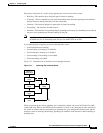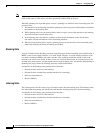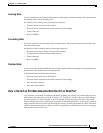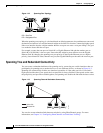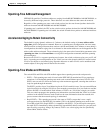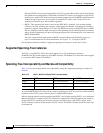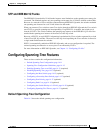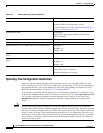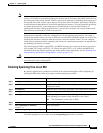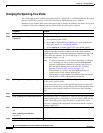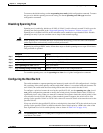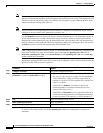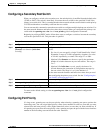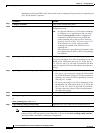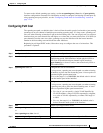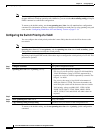
14-13
Cisco ME 3400 Ethernet Access Switch Software Configuration Guide
OL-9639-06
Chapter 14 Configuring STP
Configuring Spanning-Tree Features
Note If you have already used all available spanning-tree instances on your switch, adding another VLAN
creates a VLAN that is not running spanning tree on that switch. If you have the default allowed list on
the trunk ports of that switch, the new VLAN is carried on all trunk ports. Depending on the topology of
the network, this could create a loop in the new VLAN that will not be broken, particularly if there are
several adjacent switches that have all run out of spanning-tree instances. You can prevent this possibility
by setting up allowed lists on the trunk ports of switches that have used up their allocation of
spanning-tree instances. Setting up allowed lists is not necessary in many cases and can make it more
labor-intensive to add another VLAN to the network.
Spanning-tree commands control the configuration of VLAN spanning-tree instances. You create a
spanning-tree instance when you assign an STP port (an NNI or ENI with STP enabled) to a VLAN. The
spanning-tree instance is removed when the last port is moved to another VLAN. You can configure
switch and port parameters before a spanning-tree instance is created; these parameters are applied when
the spanning-tree instance is created.
The switch supports PVST+, rapid PVST+, and MSTP, but only one version can be active at any time.
(For example, all VLANs run PVST+, all VLANs run rapid PVST+, or all VLANs run MSTP.) For
information about the different spanning-tree modes and how they interoperate, see the
“Spanning-Tree
Interoperability and Backward Compatibility” section on page 14-10.
Caution Loop guard works only on point-to-point links. We recommend that each end of the link has a directly
connected device that is running STP.
Enabling Spanning Tree on an ENI
By default, spanning tree is enabled on all NNIs on the switch and disabled on ENIs. Beginning in
privileged EXEC mode, follow these steps to enable spanning tree an ENI:
To disable spanning tree on an ENI, enter the no spanning-tree interface command.
Command Purpose
Step 1
configure terminal Enter global configuration mode.
Step 2
interface interface-id Specify a UNI or ENI interface to configure, and enter interface
configuration mode.
Step 3
no shutdown Enable the port, if necessary. By default, UNIs and ENIs are disabled.
Step 4
port-type eni Configure the port as an ENI (if not already configured).
Step 5
spanning-tree Enable spanning tree on the interface. The interface will belong to the
switch spanning tree instance along with NNIs in the VLAN.
Note This command is visible only on ENIs.
Step 6
end Return to privileged EXEC mode.
Step 7
show spanning-tree interface
interface-id
Verify your entries.
Step 8
copy running-config startup-config (Optional) Save your entries in the configuration file.



